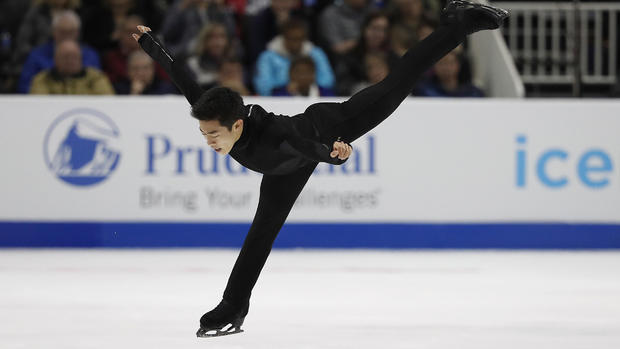Insider tips to help you train like an Olympian
The 2018 Winter Olympics is in full swing in Pyeongchang, South Korea and athletes from across the globe are dazzling audiences worldwide with their incredible feats. Whether it's landing a triple axel, racing down the giant slalom, or gliding around the speed skating track, these world-class competitors have prepared their whole lives for this moment. They also have a team of trainers and coaches helping them reach their peak.
"Most of these athletes have been training for years to get where they are and many have been training for decades just for that one competition," Dr. Tim Miller, director of the Endurance Medicine Program and associate professor of orthopaedics and sports medicine at The Ohio State University Wexner Medical Center, told CBS News. "It usually starts from early childhood or at least early adulthood. So obviously it's a long haul."
While most of us are never going to compete in the Olympics, experts say we can still benefit from incorporating some aspects of elite athletes' training into our everyday workouts.
Set goals
Olympians train with a very specific goal in mind: to be the best in the world at their particular sport. Even if your exercise goals are far more modest, experts say it's helpful to have a goal to work toward.
"It can be helpful for a number of reasons," said Dennis Cardone, DO, chief of primary care sports medicine at NYU Langone Health. "Psychologically, attaining goals is certainly a good feeling. Keeping a timetable also allows you to see when you're meeting your goals and how you're improving."
Whether your goal is to run a half marathon or master a series of yoga poses, set it early on, plan out a strategy to get there and make sure to chart your progress.
Cross-train
While Olympic-level athletes compete in specific events, their preparation often involves training across a variety of disciplines.
"If you do the same workout every day or very regularly, eventually you'll start to develop overuse problems. That means the tendons, soft tissue, and bones can start to get overworked and develop some damage or degeneration," Cardone said.
Varying your workout routine helps lower the risk of these types of injuries.
Cardone, who's been a physician for USA wrestling and fencing, says as a general rule of thumb he advises people to try to avoid successive days of the same type of workout. For example, if you're training for a marathon, run one day and then the next try an alternate activity, such as cycling, swimming, or an elliptical machine.
Weight training, particularly involving the core and the muscle groups used during your particular sport or activity, is also an important part of any workout regimen.
Practice good injury prevention
In addition to cross-training, there are other important steps you can take to prevent injuries.
Staying hydrated is an important part of making sure you exercise safely.
"Even in cold weather, this is important. In the wintertime it kind of gets overlooked," Miller said. "People think it's cold and they're not sweating as much and don't need to drink as much fluids as they would otherwise. That's definitely not true. You can lose just as much water if you're training hard enough as you can in warm weather." Miller has been a team physician for the Ohio State Buckeyes since 2011 and has worked with the U.S. Olympic team at the Olympic Training Center in Colorado Springs since 2015.
Flexibility is another key component to preventing injuries. Stretching and warming up before a workout can help improve flexibility and help you avoid getting hurt.
Cardone also notes it's imperative to have at least one recovery, or rest, day every six days.
Pay attention to other lifestyle habits
When training for any kind of event – whether it's elite or recreational level – keep lifestyle factors such as diet and sleep in mind.
"It's important to fuel your body appropriately," Miller said. "That means making sure you replace enough of your protein."
For example, oftentimes people who train for marathons think they just need to take in a lot of carbs to energize their body for longer distances. "What they don't always realize is that through all that training, your muscles are breaking down, too, especially over longer runs," Miller said. "And when that happens you need the appropriate amount of protein to rebuild those muscles, otherwise the muscles are going to start wasting away."
Getting a good night's sleep is also really important for muscle recovery.
"If you talk to Olympic athletes, most will say they're getting 10 hours of sleep per night," Cardone said. "For most of us who are working and have lives, we may be lucky to get six hours. But sleep is really important for recovery and a sound mind."
Challenge your body at the end of your workout
Miller said a common technique used in Olympic training is to shock, or challenge, the body at the end of a workout.
"What some coaches will do is when the athlete thinks they're at the end of the workout, they'll throw in some additional challenges the athlete wasn't expecting," he said. "So if they've been doing a workout for the same way for a few weeks and they've almost gotten used to the way it is performed, forming that muscle memory, this is a way add a challenge, an additional challenge that upsets what the muscles are used to. This makes them go to a higher gear even they're fatigued and even when they don't feel like they can do it."
If you don't have a coach or personal trainer, you can still adopt this strategy into your workout. Miller suggests taking pieces of paper and writing down various extra challenges. These may include running up a hill and back down at the end of your run, or doing an additional set of pushups or squats. Include an equal number of notes that say "end your workout now." Then draw one before each workout. This way, you'll have an equal chance of finishing your routine as normal or kicking it up an extra notch with an additional challenge.
Harness mind over matter
So much of competitive sports involves mental conditioning. "Sometimes what separates the gold from the silver or the gold from a non-medal is truly a psychological component," Cardone said. "Someone gets a little more stress when they're out there. Maybe they succumb to the pressure."
He notes that in recent years, coaches and trainers have been paying more and more attention to the mental aspects of competing.
"Nowadays, almost across the board [at] colleges, professional teams and at the Olympics, psychology is a big part of it. Teaching the athletes how to focus better, how not to be stressed, how to take the crowd out of it and get into the zone better, as well as relaxation and meditation techniques. They find that it does help the athlete perform better," Cardone said.
He notes that non-competitive athletes may also find benefits in practicing meditation. "A sound mind and relaxation can go a long way in helping anyone progress and just enjoying a sport more," Cardone said.





